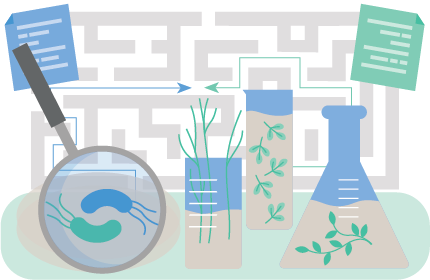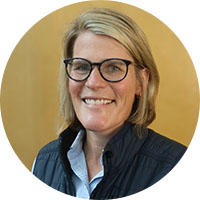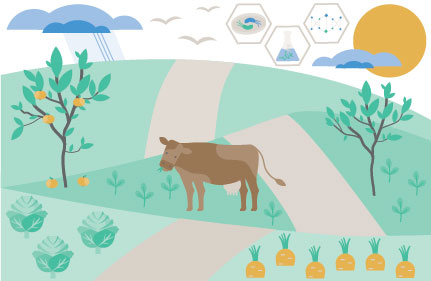Innovative Crop Management: Biological Inputs for a Sustainable Future
-

December 6, 2024
10:00 am - 11:45 am(Virtual, Time in EST)
Washington, D.C., USA
The term “biologicals” refers to a broad category of products derived from or consisting of living organisms with a range of functionalities, including biofertilizers, plant growth regulators, biostimulants, and biopesticides. In recent years, the sector has witnessed an explosion of biological product start-ups, mergers, and investment from big agricultural companies. This growth has propelled innovation, leading to improvements in bioprocessing, fermentation techniques, and delivery systems, along with a better understanding of biological isolates, refined biological compounds, symbiotic organisms, and microbial-based solutions.
The heightened interest in what biologicals can offer brings to the forefront the complexities of integrating these products into existing agricultural systems and navigating the regulatory landscape. Currently, biologicals are regulated under policies originally designed for synthetic chemicals with single, easily categorized functions. This approach can lead to challenges in protocol development and may inadvertently create barriers to the adoption and competitiveness of biological products. The multifunctional nature of biologicals necessitates a review of regulatory frameworks to ensure they support innovation while safeguarding environmental and economic interests.
On December 6, 2024, the Agriculture & Food Systems Institute (AFSI), in collaboration with the Biotechnology Innovation Organization (BIO) and the Biological Products Industry Alliance (BPIA), organized a session at The Dupont Summit on Science, Technology, and Environmental Policy 2024 virtual conference, with the objective of:
- Fostering a comprehensive understanding of how biological products can be effectively integrated into modern agricultural practices among policymakers, industry experts, producers, and market participants.
- Examining the pathways to regulatory approval and market adoption, with an eye toward ensuring that innovative solutions provided by biologicals can contribute to a sustainable and resilient agricultural future.
- Providing context and priming a diverse set of stakeholders in the biologicals space for an in-person conference in early 2025.

Agenda
10:00 am
Welcome and Introduction to the Session
Andrew Roberts, Ph.D.
Chief Executive Officer, Agriculture & Food Systems Institute
10:10 am
Keynote
The Landscape of Plant Biologicals: Products and Regulations
Terry Stone
Chairman of the Board, Biological Products Industry Alliance
10:40 am
Panel Discussion
The Regulatory Environment and Pathway to Commercialization for Biologicals
Moderator:
Andrew Roberts, Ph.D.
Panelists:
Natasha Dixon
Regulatory Policy Manager, Regulatory Scientific Affairs, Bayer US – Crop Science
Jane Fife, Ph.D.
Chief Technical Officer, 3Bar Bio
Wiebke Striegel, Ph.D.
Senior Scientist, U.S. Environmental Protection Agency (EPA)
11:40 am
Closing Remarks
Andrew Roberts, Ph.D.
Speakers and Panelists
Keynote: Terry Stone
Chairman of the Board, Biological Products Industry Alliance (BPIA)
 Terry Stone is the founder of Stone Biological Solutions, LLC, a consultancy offering regulatory support to companies of all sizes in navigating the regulatory environment for biological products. Prior to forming Stone Biological Solutions, Terry was the Global Regulatory and Policy Leader for Corteva’s portfolio of biological products. Before joining Corteva, Terry was Vice President for Regulatory Affairs and Sustainability at Agrinos and held leadership roles with Syngenta, The Scotts Company, and Monsanto, working in global regulatory affairs, sustainability, industry relations, and research and development. He helped establish and chaired BPIA’s Biostimulant Innovation Committee and was co-founder of the Biostimulant Industry Workgroup. He has earned Master’s degrees in International Business and Entomology.
Terry Stone is the founder of Stone Biological Solutions, LLC, a consultancy offering regulatory support to companies of all sizes in navigating the regulatory environment for biological products. Prior to forming Stone Biological Solutions, Terry was the Global Regulatory and Policy Leader for Corteva’s portfolio of biological products. Before joining Corteva, Terry was Vice President for Regulatory Affairs and Sustainability at Agrinos and held leadership roles with Syngenta, The Scotts Company, and Monsanto, working in global regulatory affairs, sustainability, industry relations, and research and development. He helped establish and chaired BPIA’s Biostimulant Innovation Committee and was co-founder of the Biostimulant Industry Workgroup. He has earned Master’s degrees in International Business and Entomology.
Natasha Dixon
Regulatory Policy Manager, Regulatory Scientific Affairs, Bayer US – Crop Science
 Natasha Dixon is a Regulatory Policy Manager in the Crop Science division of Bayer US. Natasha’s experience in regulatory affairs is varied, as she has planned and executed regulatory strategies for both biological and chemical products. She is a member of the OECD Expert Group on Biopesticides and works with several industry associations, including the Biotechnology Innovation Organization (BIO), Biological Products Industry Alliance (BPIA), and Crop Life International, to promote the development and usage of biological products around the globe.
Natasha Dixon is a Regulatory Policy Manager in the Crop Science division of Bayer US. Natasha’s experience in regulatory affairs is varied, as she has planned and executed regulatory strategies for both biological and chemical products. She is a member of the OECD Expert Group on Biopesticides and works with several industry associations, including the Biotechnology Innovation Organization (BIO), Biological Products Industry Alliance (BPIA), and Crop Life International, to promote the development and usage of biological products around the globe.
Jane Fife, Ph.D.
Chief Technical Officer, 3Bar Bio
 Dr. Jane Fife currently serves as Chief Technical Officer at 3Bar Bio, the first biological CDMO focused on production of biological products for the agricultural industry. Dr. Fife’s research focuses on improving fermentation, formulation, and delivery of biologics for more effective application of beneficial microbes to promote plant growth and biological disease control. Prior to joining 3Bar Bio, she has more than 20 years of expertise in biodefense, application technology, and biologics through her technical and leadership roles at Battelle Memorial Institute and The Ohio State University. Dr. Fife holds a Ph.D. in Agricultural and Biological Engineering from The Ohio State University, where she currently serves as an Adjunct Faculty and teaches courses in engineering design.
Dr. Jane Fife currently serves as Chief Technical Officer at 3Bar Bio, the first biological CDMO focused on production of biological products for the agricultural industry. Dr. Fife’s research focuses on improving fermentation, formulation, and delivery of biologics for more effective application of beneficial microbes to promote plant growth and biological disease control. Prior to joining 3Bar Bio, she has more than 20 years of expertise in biodefense, application technology, and biologics through her technical and leadership roles at Battelle Memorial Institute and The Ohio State University. Dr. Fife holds a Ph.D. in Agricultural and Biological Engineering from The Ohio State University, where she currently serves as an Adjunct Faculty and teaches courses in engineering design.
Wiebke Striegel, Ph.D.
Senior Scientist, U.S. Environmental Protection Agency (EPA)
 Wiebke Striegel is a senior scientist at the Emerging Technologies branch of the United States Environmental Protection Agency (EPA) Office of Pesticide Programs. Her work focuses on a broad range of product characterization, human health risk assessment, and related policy questions for pesticide products derived from biotechnology. These products include plant-incorporated protectants, genetically engineered microorganisms, and topically applied dsRNA. Wiebke joined the Biopesticides and Pollution Prevention Division (BPPD) in 2016 after completing a one-year AAAS Science & Technology Policy Fellowship in the same division. Prior to joining EPA, Wiebke held a postdoctoral position at the University of Maryland. She received her Ph.D. in molecular plant biology from Colorado State University and her M.Sc. in Biology from the Technical University of Braunschweig in Germany.
Wiebke Striegel is a senior scientist at the Emerging Technologies branch of the United States Environmental Protection Agency (EPA) Office of Pesticide Programs. Her work focuses on a broad range of product characterization, human health risk assessment, and related policy questions for pesticide products derived from biotechnology. These products include plant-incorporated protectants, genetically engineered microorganisms, and topically applied dsRNA. Wiebke joined the Biopesticides and Pollution Prevention Division (BPPD) in 2016 after completing a one-year AAAS Science & Technology Policy Fellowship in the same division. Prior to joining EPA, Wiebke held a postdoctoral position at the University of Maryland. She received her Ph.D. in molecular plant biology from Colorado State University and her M.Sc. in Biology from the Technical University of Braunschweig in Germany.
Andrew Roberts, Ph.D.
Chief Executive Officer, Agriculture & Food Systems Institute (AFSI), USA
 Dr. Andrew Roberts joined the Agriculture & Food Systems Institute (AFSI) in December 2009 as the Deputy Director of the Center for Environmental Risk Assessment (CERA), where he developed tools and materials for use in training and capacity building related to the problem formulation approach to environmental risk assessment and served as the coordinator for CERA’s capacity building projects under the USAID-funded South Asia Biosafety Program (SABP) and the World Bank-funded Partnership for Biosafety Risk Assessment and Regulation, in Bangladesh, Pakistan, and Vietnam. He also provided technical support for capacity building work in Brazil, India, Japan, Chile, and South Africa. In January 2015, he became the director of CERA, as well as the Center for Safety Assessment of Food and Feed (CSAFF), which worked on food and feed safety assessment for foods derived from genetically engineered plants. The two centers were later consolidated under the Research Foundation, for which he became Deputy Executive Director in January 2017. When the organization became the Agriculture & Food Systems Institute in 2020, his title shifted to Vice President – Biotechnology, and he assumed the role of Chief Executive Officer later that year.
Dr. Andrew Roberts joined the Agriculture & Food Systems Institute (AFSI) in December 2009 as the Deputy Director of the Center for Environmental Risk Assessment (CERA), where he developed tools and materials for use in training and capacity building related to the problem formulation approach to environmental risk assessment and served as the coordinator for CERA’s capacity building projects under the USAID-funded South Asia Biosafety Program (SABP) and the World Bank-funded Partnership for Biosafety Risk Assessment and Regulation, in Bangladesh, Pakistan, and Vietnam. He also provided technical support for capacity building work in Brazil, India, Japan, Chile, and South Africa. In January 2015, he became the director of CERA, as well as the Center for Safety Assessment of Food and Feed (CSAFF), which worked on food and feed safety assessment for foods derived from genetically engineered plants. The two centers were later consolidated under the Research Foundation, for which he became Deputy Executive Director in January 2017. When the organization became the Agriculture & Food Systems Institute in 2020, his title shifted to Vice President – Biotechnology, and he assumed the role of Chief Executive Officer later that year.
Prior to joining AFSI, Dr. Roberts worked at the U.S. Department of Agriculture (USDA) in several different capacities, all related to the regulation of agricultural biotechnology. He began his career at USDA as an AAAS Risk Policy Fellow in the Office of Science of Biotechnology Regulatory Services (BRS), the group responsible for regulating genetically engineered plants at USDA’s Animal Plant Health Inspection Service. After spending a year in the New Technologies office of the Foreign Agricultural Service serving as the lead for USDA’s efforts related to the Cartagena Protocol on Biosafety, he returned to BRS to serve in the International Affairs branch where he remained until joining AFSI.

